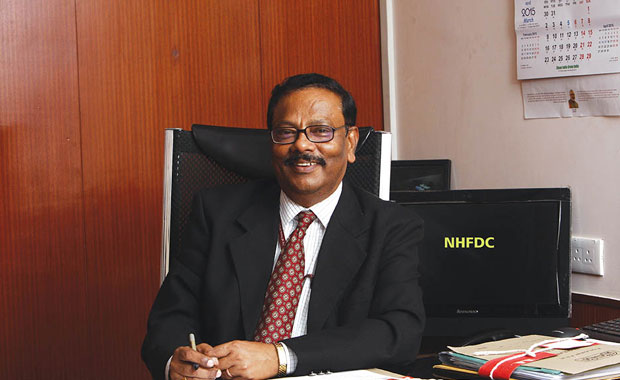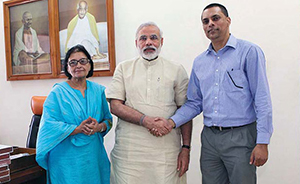"We are meaningfully reaching out to more disabled persons than ever before"
Interview with Mr P.C. Das, Chairman and Managing Director, National Handicapped Finance and Development Corporation
How are you engaging the private sector to take up more schemes related to the handicapped segments?
At our Ambala camp in November 2013, soon after I joined, there were 11,000 disabled persons in attendance, more than double our initial expectations. Over 1,500 such persons received vocational training certificates while hundreds got other certificates and assistive devices in the presence of the Governor of Haryana and a host of central and state ministers. It was the very first time that we had taken such kind of camp to the people. It dawned on me that we can effectively reach large numbers through such camps, instead of limiting ourselves by sitting at our offices. At Ambala we invited 25 corporate houses. As you know as per Government policy they engage in corporate social responsibility (CSR). The result was that 886 candidates received job offers on the spot. Another camp was held at my birthplace, Mongalkote in West Bengal’s Barddhaman district. More than 25,000 turned up for a mega camp, over Rs 1.75 crore worth of assistive devices were distributed apart from scholarships and loans. It was followed up with a job fair in Barddhaman where brands such as Microsoft, Lemon Tree and Hyatt Regency made recruitments. Typically in this district can also find plenty of rural clean-brick manufacturers. These people wanted more than 450 supervisors from the disabled segments.
How are you enhancing capacity building for loan disbursements and improving the functioning of state channelizing agencies (SCAs)?
At present there are four PSU banks—Bank of Baroda, IDBI, Punjab National Bank and Andhra Bank—that are disbursing Government finance. Besides, we have MoUs with 26 regional rural banks across UP, MP, Chhatisgarh, Maharashtra, Tamil Nadu and Karnataka. They remain one area of channelizing funds. But the main sources of disbursement are the state channelizing agencies, or the SCAs. Concerned state welfare departments are empowered to decide benefits to the tune of Rs 5 lakh. Beyond that amount they need our scrutiny and approval. We have now developed a financial accounting software whereby someone applying to the state is also simultaneously applying to us. This helps us keep a check on proper disbursement at state levels, and prevents any kind of bias to creep in. If anyone is denied a loan after applying, we can now ask state Governments the reason for the denial. This has already increased my success rate of identifying beneficiaries on the ground.
Keeping in line with this Government’s intent on transparency, you have a Whistle Blower Policy. Kindly elaborate on this…
This indicates the sincerity of the Government in maintaining 100 per cent transparency in dealings. We will show zero tolerance for lack of transparency. There was no whistle blower policy in NHFDC when I joined. I had always strongly felt for a need to have one. I took up the matter with my board that has many learned persons that includes the joint secretary and financial advisor of my administrative ministry. I explained to them that if any individual provides me information related to embezzlement of public funds, dishonesty, corruption, mismanagement, I’d keep this individual’s identity a complete secret. Secrecy is paramount and I had learnt this during my stints with the ITBP, SSB, customs and excise where secret funds are allocated to buy sensitive information. I am grateful to my board for adopting this policy.











Comments.